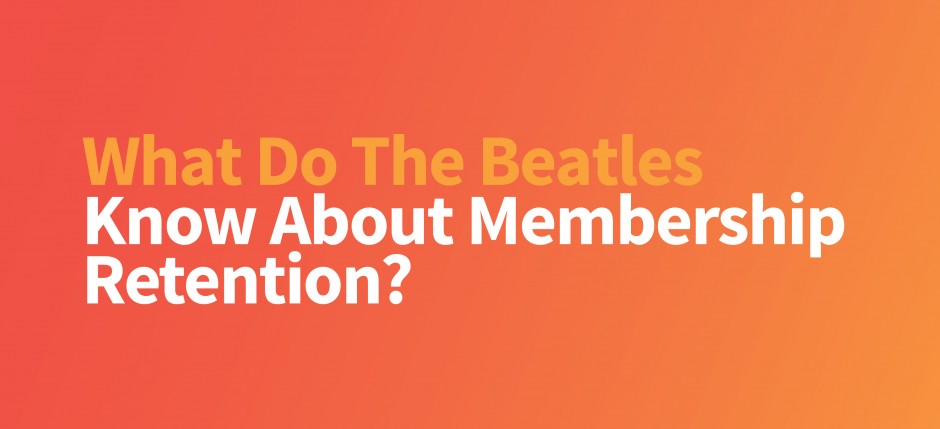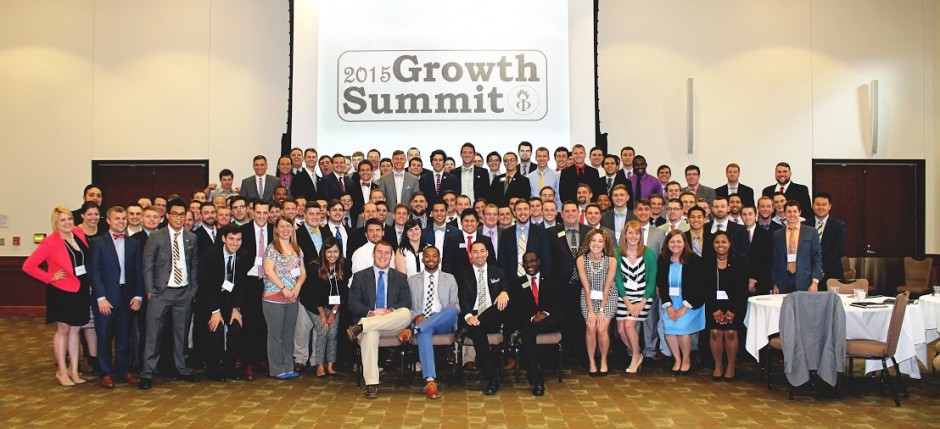
by Erin Chatten
The Beatles had it right… all you need is love. But in this time where campuses come to life with the start of a new academic year, I think when we say, “all you need is love”, what were really thinking and saying is: “all you need is a friend”.
Think about it. This is some of the scariest few weeks that most college students experience. Especially freshmen. You walk into a new campus, new classrooms, and a new social scene –surrounded by new people – and all you are looking for are a few close friends.
I think we have forgotten that everyone is looking for the same thing as we are… a little love, a little friendship.
In some preliminary research that is currently being conducted with potential fraternity/sorority members across the country, the same message is being told time and time again. People join organizations, especially fraternity and sorority, because they want somewhere to belong on their campus. They aren’t wooed by the amazing t-shirts and banners your fraternity or sorority has on your house or around campus. They are won over already that your organization’s function is to help them find friendship and belonging.
We know from our retention studies that men and women leave their organization due to misaligned expectations and lack of connection. “Misaligned expectations” means simply “what you sold me in recruitment and what I received are not the same thing”.
Lack of connection is exactly as it sounds, if they don’t find at least one person they connect with, they will leave. In fact, men are more likely to leave their fraternity in the first semester of membership while women are more likely to leave after two years.
All they need is a friend.
Notice I didn’t say all they want is a friend, all they desire is a friend, or all they ask is for a friend. That’s because finding that friendship and finding that belonging is a necessity to retaining members.
We think that our organizations are designed in a way that everyone will naturally find their best friends and feel that belonging immediately, but it is easy for individuals to get lost in the crowd. Here are some ways we can improve our friendship making skills in our organizations with new and existing members:
If our chapters can be filled with fewer strangers and more friends, we can improve our retention and satisfaction within our organizations. It just takes a little bit of love, and some friendship.

By Matt Mattson
Dear Brothers,
Allow me to clarify. I’m writing to the fraternity men who care. To the ones who are trying. To the ones who raised their hand and volunteered to be a leader despite the negative reputation and history of institutional debauchery that exists in fraternities.
To you, gentlemen, I write this letter of support and gratitude. To you, gentlemen, I sincerely say, “Thank you.”
From the outside, fraternities can sometimes look like a clown car full of drunken evil-doers. But those of us who can see the inside of today’s college fraternity know differently. We know the heavy weight of organizational history and individual futures rests directly on the shoulders of 18 to 22-year-old men. Not the guys in the back acting like children, but the young men in the front who have chosen to carry on the promise of fraternity out of duty, honor, and integrity.
If you’re reading this, it’s probably YOU I’m writing to. You’re probably a chapter or council leader, and that’s not easy. In fact, leading a fraternity is really hard. You feel pressure from above, below, and all around you. Everyone wants your chapter to be something different. The loud guys in back want it to be more fun (nothing wrong with that). Your headquarters wants it to be more responsible (nothing wrong with that either). Sororities on campus want this, Greek advisors want that, and the internet seems to want something from you too (cool pics, killer videos, sick party shots).
Here’s the thing. You’re in charge. You’re leading. You’re on the ground fighting the everyday battle of fraternity. And I just want you to know you’re appreciated. And I also want you to know that you have to choose what you’ll be. You can’t please everyone. You can’t even really please all the different ideas you probably have in your head. You have to lead your chapter in such a way that IT IS ABOUT SOMETHING.
If you want the best people on campus to join your chapter, it can’t be about: leadership, scholarship, service, fun, philanthropy, sorority relations, cool parties, networking, and the tightest brotherhood. If that’s what you attempt to be — all things to all people — you’ll fail. You’ll be mediocre. You’ll be a perfect landing place for the most average potential members on campus.
Don’t be average. Don’t be mediocre. Choose to be great at something.
If you want recruitment success, retention success, and reputational success… and maybe even some personal fulfillment along the way… make your chapter about something. Be the chapter that cares, the chapter that participates in activism, the chapter that wins sports, the chapter that has real human conversations with people on campus, the chapter that professors appreciate, the chapter that moms send thank you notes to, the chapter that changes the way people see fraternity, the chapter that sings, the chapter that affirms and celebrates differences, the chapter that dominates philanthropy, the chapter that shapes guys into humble modern gentlemen. Whatever. Just pick something. Be about it. And don’t be about anything else. Make everything you do about your cause, your “why,” your purpose, your… something. Be about something.
Mostly I wanted you to know that you’re appreciated and you have permission to choose what your chapter will be about. Own your leadership opportunity. It is short and fleeting. Most chapter and council officers are half way through their time as a leader. Don’t waste another moment.
Oh, and remember one other thing. We’re on your side. The people at Phired Up, Innova, and TechniPhi… we really do believe in you. You are why we do this work. You are the future of fraternity, and we couldn’t be more grateful for your efforts.

by Erin Chatten
Walk over to a window or a mirror in your house, your car, or your dorm room right now and do me a favor. Fog it up a little. Take a deep breath in, open your mouth wide, and exhale a blast of hot air from your belly toward the surface in front of you. Now, look at that fogged spot. How well can you see? That all depends on how big of a breath you just took. Maybe you fogged the glass for just a moment in a small spot and it disappeared after two seconds. Perhaps you gave it everything you had and you added a little smiley face into the mix. Either way, you fogged your perception for a moment. Your vision was not clear. It was not transparent.
Often times, this “fog” is what potential members see during recruitment. We fog their perception of our organizations by blowing out a bit of hot air.
We tell them about the cool parties we attend with a breath of hot air. We tell them about how we became magical best friends with the other 120 members of our organization overnight with another breath. We smile and nod and act as if their interests are the same as ours, yet another big blast of hot air. We tell potential members about all the partial truths about our organizations that fog their perception of what membership in our organizations actually looks like.
It’s time to get real. It’s time to wipe the window clear of fog and to start getting transparent with our potential brothers and sisters.
Over the past two years, I have worked on two projects that revealed these fogged perceptions. In our retention research, I called up members that had left their organizations to ask what led them to leave fraternity/sorority life. In another study, current and new members were asked to explain what they wish they knew about fraternity/sorority membership before they joined. These studies revealed two major themes:
1. If we are not transparent about our organizations, people will LEAVE them.
2. We are not covering the information in recruitment that potential members really want to hear.
The conversations with members who have left our organizations show that one of the leading reasons members are leaving is due to misaligned expectations. To put it simply, what we say while recruiting members and what they experience as a member are two entirely different realities. We present them with the fogged version of membership, but once the fog clears, they can see through all the fake stories and misconstrued realities. When reality does not match the fogged perception, these members are at risk for leaving.
Let’s stop blowing out hot air and start telling potential members what they want to hear. Through our research on potential new members, we uncovered five questions that are being hidden or left unanswered in the recruitment process:
When we answer these questions transparently, we show the true and unfogged version of our chapters. Real does not need to be negative, but it does need to be honest. Are you best friends with all 120 members of your chapter? My guess is no. However, I can bet that you treat them all as family. Sometimes family disagrees, sometimes family unites over a common cause to accomplish great things, and sometimes you are closest to just one or two members of your larger family group. This is what we call reality, not hot air fallacies.
Start unfogging your recruitment by being transparent instead of blowing the hot air that prevents potential members from seeing what your organization will actually offer them. In return, your members will know what to expect and are more likely to stay engaged when they can see the whole picture clearly.

By Dr. Colleen Coffey-Melchiorre
We talk a lot about recruitment of new members, but what about sustaining that membership for a lifetime? Too often members enthusiastically join an organization only to lose their passion a few short months later. At Phired Up, our team is particularly curious about why these members withdraw from their organization. Why do people swear their lives to a fraternity or sorority and then leave? What makes people exit organizations they once pledged to love forever?
We have heard from hundreds of “left members” (people who resigned membership of their own accord). What we’ve learned about their top reasons of resignation are surprising. Here are two of the most common reasons:
1. Mis-aligned expectations. – “I thought I was getting into one thing, and it was totally different after a while.”
2. Lack of Connection. – “I did not matter to the organization in the way I thought I would.” At Phired Up, we call this reason: “people join people and people leave people.”
As leaders of fraternities and sororities, your primary job is to conceptualize the core purpose of your organization through example and action. This means understanding what your group is all about, communicating that purpose, and acting on it.
To help make this happen, start by examining current practices. How does your organization communicate who they are? Are we lying (to ourselves and others) or telling half-truths? Are we sugar coating the nature of membership? Why?
How often are we considering our people first? Are we focusing on listening to our members? Do we teach inclusion? Are we intentional about making sure everyone has a place? How often do we ask members what they think and how they are feeling?
It’s likely your group is somewhere between having no retention focus and being rock stars at retaining members. The truth is, retention is work because it’s about building and maintaining meaningful relationships, knowing your people, and communicating your actual experience to the outside world.
Ready to start building better retention practices? Start by doing these four things:
1. Evaluate your roster. Who is disengaged? Why? Can someone intentionally and deliberately build a relationship with that person to include and understand them more?
2. Evaluate your recruitment strategies. Be more real. Let’s be honest, you don’t have football throwing barbecue parties on the lawn everyday of the year. You don’t always dress in matching lily prints and love everyone all the time. How can you showcase the beautiful, and sometimes broken, reality of your group? Be honest about time, money, values, and day-to-day experience.
3. Put your people first. Work to make each person in your group know their specific purpose. Share it with them and appreciate them.
4. Ask questions. Evaluate your membership’s current feelings by asking them what they like and don’t like about their membership and what they need more of.
What sustains people in relationships, religions, on diets, and in brand loyalty? Getting what they thought they would get, and feeling like they are an important piece of the whole. By promoting the truth about what it’s like to be part of your organization during recruitment, and through taking active measures to help each member feel important, you can instill a similar sense of loyalty in your members and boost your chapter’s retention results.

By Matt Mattson
We’ve been in this fraternity/sorority business a while, and I’m proud of the impact we’ve made. Many of our friends and colleagues in the industry often ask us, “So, what’s next?” I love that question.
Obviously, when Phired Up purchased a marketing company and created a technology company last year, that was a pretty major step forward. But we’re never satisfied. With Jessica Gendron Williams as your CEO, you can’t be satisfied. She won’t allow it. I love that about her. She’s pushing our team to create and innovate as always.
When “innovation” is a core value of your company, you have to ask, “What’s Next?” a lot.
I don’t really know for sure “What’s Next” for the fraternity/sorority world, but I’ll make some guesses.
I have some other thoughts, but I’ll stop at 6 wild predictions for the future of fraternity/sorority life. Some of my other ideas are a little cynical, admittedly — gluten free chapters, parents rooms in chapter houses, and republican vs. democratic umbrella groups. Mostly though, I’m hopeful for our industry. We are evolving. We are advancing. We are innovating.
I’m proud that Phired Up is working every day to play a small role in the continual innovation of our movement.
What’s Next?

by Matt Mattson
Henry Ford didn’t invent the automobile. He just figured out how to efficiently give the gift of motorized transit to the masses. He made it easier to build a complex machine. He simplified a previously complicated process.
This is what we (attempt to) do at Phired Up.
Joining a fraternity or sorority is a complex, complicated process that is done by hand, one-by-one, face-to-face. Getting a fantastic human being to join your organization requires the attention of a handcrafted masterpiece. Recruitment is emotional, is entirely about trust and caring and attention and relationships.
But that doesn’t mean we can’t make it easier. That doesn’t mean we can’t help you focus your energy on the stuff that matters (and not be distracted by the stuff that doesn’t). We can help you build a CONNECTION MACHINE — a system for efficiently (but still humanly, and beautifully) crafting relationships with the best men and women on campus so that they are inspired by the possibility of membership in your esteemed brotherhood or sisterhood.
When we teach Dynamic Recruitment. When we teach Social Excellence. When we prepare chapters for formal recruitment. When we teach Retention. When we prepare recruitment counselors. When we help new members prepare for recruitment with iValU. All of these things are parts to the same CONNECTION MACHINE. They all are fueled by real human relationships. They all can be measured by the quantity and quality of conversations our members have.
The trick is to stay focused on the parts of the machine that actually work. The trick is to continue to tweak the machine so that it makes your lives easier and more fun while producing better and better recruitment results.
Doing what we do (and you doing what you do as recruiters) requires equal parts engineer and artist. Both sides of the brain must be engaged. We must systemize human connection. This can be done. The best chapters are doing it. It’s what we’ve been teaching for well over a dozen years now, and it is what is raising the bar for the entire fraternity/sorority world.

Phired Up Productions is so grateful to the over 130 Fraternity/Sorority professionals who joined us in Indianapolis on Monday for GROWTH SUMMIT/FRATERNITY CONSULTANT TRAINING 2015. The day was a huge success with education for many inter/national fraternity/sorority headquarters professionals.
There were specific education tracks for new consultants (many were there on their first day on the job!), seasoned consultants, expansion professionals, and director level headquarters staff. Recruitment, marketing, retention, technology, building staff culture, and many more topics were covered throughout the day.
Phired Up is proud to support the industry with this event. We gather together those charged with growth, all are invited, and create a space for learning, discussion, planning, and networking.

By Paul Manly
Last Fall I had the pleasure of hosting individual recruitment consultations with a handful of recruitment chairmen at a large university. I’ve gotten to do hundreds of these – but this one I’ll never forget. Let’s call him Jimmy.
I asked, “Jimmy, why are you here? Why did you come on campus on a Saturday morning to talk recruitment with us?”
Jimmy replied, “Paul, I was lied to. I was recruited to join my fraternity last semester, and everything they told me about my fraternity was a lie. Now I’m stuck in it, and I’m committed to making it better.”
We need to stop lying about our organizations.
So often men and women join fraternal organizations and the experience they’re promised is not the reality. We tell potential new members exactly what they want to hear to get them to join.
You’ll hear come Sororities claim:
You’ll hear some Fraternities claim:
We’re the best, greatest, closest… with the highest, sharpest, smartest… But we can’t show quantifiable reasoning.
It’s no wonder we experience awful retention rates.
Recently, I moved to a new city and joined a new gym. I wanted to make sure I had the ability to bring guests to my new gym, and I would have access to the other locations in the gym’s network. When given a tour, the manager told me I’d have virtually unlimited guest passes and I could use any gym in their network with membership.
Last week, I tried to use a different location in my gym’s network. It turns out you have to pay extra for that. This morning, I tried to bring a friend to the gym. It turns out guest passes ate $5 per day. WHAT?!
These misrepresentations have caused me to not enjoy my gym as much as I thought. If those facts were shared with me during the joining process, I may have still joined. This gym is the closest in proximity to where I live, so I probably would have joined anyway. But now I’m having second thoughts about maintaining my membership… and that’s a problem.
As many as 1 in 5 students quit a Fraternity or Sorority each year. Dynamic Recruitment teaches us that people join people. Well, people also leave people. The core of this message is that authentic relationships are the best way to recruit and retain our members.
As a guideline for better engagement, pay attention to these 6 powerful lessons:
1. Expectations – Many former members report leaving because of unmet or misunderstood expectations of membership.
2. People – Almost all membership attrition is due to a lack in emotionally solid relationships.
3. Purpose – Connecting an individual’s values to the true purpose of the organization is paramount for member retention and engagement.
4. You Matter – Chapters just made of new member classes, officers, and sub-groups — they’re made of individuals who require love and care.
5. Learning & Growing – Members must constantly have ways to learn and grow from the fraternal experience.
6. Repeat – A repeatable, optimized system for retention and engagement should be a top priority for fraternities and sororities.
Learn more about retention in Fraternity and Sorority here. And most importantly, don’t lie to prospects. People join (and stay with) people — especially people they know they can trust.

by Paul Manly
People join (and stay in) organizations because of relationships (research from Dr. CoCo taught us that). We live in a world where transparency and intentional discussion about expectations during and after recruitment significantly impacts retention. When I recruit, or when I coach chapters to recruit, I share a three part plan for keeping members involved and engaged throughout their membership.
Part 1. Recruitment
I believe that the most powerful tool recruiters can have is honesty. The most successful recruiters share with PNMs what their chapter is really like. They share what their chapter truly values. They share their chapter’s genuine vision for the future.
Transparency in recruitment leads to trust, which is the foundation to every relationship. New members should know 100% who they’re joining and what they’re getting themselves into before they commit.
When each new member joins because they all got excited about the same message and the same vision, the recruitment team has done it’s job. Research shows us that when every new member joins with the same expectations of membership – and it is what was promised to them during recruitment – they’re members for life. If it’s different, that’s when we see poor retention.
Part 2. Pre-close
The pre-close is another powerful tool any recruiter can have. If done correctly, you can virtually guarantee a PNM accepts a bid when he is extended one.
The pre-close is performed to decipher the interest level of a new member and gauge hesitations before a bid is extended. Transparently addressing all of a PNM’s concerns during and providing honest and factual information is a crucial part of the pre-close.
Simply ask, “if we were to offer you the chance to join, what would you say?”
If the answer is yes, that’s a good time to have a bid in your back pocket. If the answer is no or maybe, now is the time to learn what hesitations the PNM has to joining, and offer genuine, transparent information to help them make the best decision. I like to communicate to the PNM out loud, “I need to be as transparent as possible during this process.”
Part 3. Recruitment Again
Recruitment is never over. Just because someone has accepted a bid doesn’t mean that we can stop recruiting them. New members must continue to be “recruited” all the way through initiation (and throughout life as an alum). We can not take their membership for granted. Prevent drop off by thinking of them as prospects who you continue to recruit throughout the semester. New members need to feel welcome and important every day.
Have honest discussions with new members about their experience periodically. Ask things like, “How is your experience so far? Is it different from what you expected? How can we make your experience better here?” People stay because they’ve developed quality, genuine relationships.

It has been anecdotally reported that as many as 1 in 5 students QUIT fraternity and sorority each year. As a fraternity/sorority leader, you know from experience that far more than that become disengaged or completely disappear before they graduate. Retaining the best of the best of our fraternity/sorority members is a major challenge that requires thoughtful, intentional, and educated effort.
Phired Up provides research and training services to help fraternities and sororities KEEP more of the members they recruit. Watch the video and read the article below to discover what we’ve been learning!
My name is Dr. Colleen Coffey-Melchiorre and I am the Research Director and Retention Specialist at Phired Up Productions. I’ve been around for a while and wrote a cool book with our CEO back in the early days. I get to do a lot of stuff with some of the most brilliant minds in the inter/national fraternal world and am asked to speak about research and a host of other things to groups of people a lot. I am humbled everyday.
I’d like to tell you a little bit of my sorority story as a means of sharing some of the lessons we’ve learned from our research studying “Why do people leave fraternities and sororities?”
I prefer to be known as just Colleen or, as our staff affectionately refers to me, “Coco”. Coco is not a name that was given to me by our staff members, it was given to me by a very special and unexpected little girl in my world. In her second year of life she was trying to say “Colleen” to no avail and her mother taught her to say “Coco” instead and it stuck. Her mother is my favorite chapter sorority sister of all time and one of my best friends to this day even 14 long years after my initiation. Since I have made a living out of working with fraternities and sororities in some capacity in the last decade it may surprise you to know that one of my two very best and closest sorority sisters is, in fact, a left member. She chose to disaffiliate, de-sisterize, go in-active, turn in the pin, release, remove, self-suspend, pull a Murphy- whatever you call it- in her third year of college and there was nothing I could do alone to keep her in the chapter. She left because she chose to be a mother to that precious little girl and did not feel too terribly supported in that decision by our chapter of the sorority.
Something else that might surprise you to know about me is that I used to be a horrible recruiter. Like used car salesman kind of horrible. My sense was more is better, and if we could recruit more women faster that would be even better — and recruiting a lot of women faster and without a lot of questions was the best. I did a lot to grow the quantity of members in my organization as an undergraduate woman. I was great at selling the sorority experience because my experience was great. I sold the experience to a lot of people, some of whom I neglected to tell in addition to getting to be a part of the awesomest sisterhood in America there were pretty hefty dues and attendance requirements associated with membership. Some women I recruited during my collegiate years in this way are now, sadly, left members. They left because they did not really understand or buy in to what they were joining in the first place.
I was President of my chapter in college. It’s one of the best experiences I have ever had in my life, but getting there was full of awful drama. Drama that, to this day, makes me queasy. I ran against another person for the office and during the months leading up to our election day some pretty scary campaigns were waged against one another and it divided the chapter. Conflict was all around us by the time we got to the election. In the end I won (probably by 51% or something). In the end, we lost a lot of women. The aftermath of that conflict was that many folks chose to become left members. Women, who, today are business owners, tremendous mothers, teachers, coaches, executives, philanthropists, artists, and friends.
As a part of our retention research, I have had the opportunity to talk to over 200 men and over 1,000 women who have selected to leave the fraternity/ sorority experience. I have asked them, through surveys and conversations, what made them choose to leave their organizations. I have heard stories that made me laugh and some that made me cry – stories that haunt me as an advisor and researcher, stories that make me want to “fix it.” I know that for all those men and women who have left there are thousands more who disengage every year and just stop showing up – they stop caring – and I’d be willing to bet the reasons they stop caring are the same reasons some folks just leave. I can say with utmost confidence for women and with an informed hypothesis for men (note the disparity in participant gender identification) that people leave our organizations because of lack of connection, misaligned expectations, and discord.
Lack of Connection: A sense or feeling that one does not belong or matter to an organization
Mis-aligned Expectations: Not understanding or being encouraged to embrace the expectations of membership OR being sold and told one thing while being recruited and experiencing another
Discord: Conflict stemming from factions, cliques, bullying, or issues with leadership that upsets the harmony of an organization and/or an individuals place in an organization
But what about money…time… lack of parental support…competing priorities… the smelly food in our house… not wanting to live in our house… what about all those other things?! What about all those reasons people normally give to us as to why they are dropping out?!
I hate to break it to you, but for most people those are the surface reasons they give; I heard them often as chapter president. When we dig a little deeper as to what is really happening the truth is revealed and mostly it is about lack of connection, misaligned expectations, and discord.
This year, we will be launch a training initiative on retention and membership engagement. We are already piloting several educational pieces with one of our phavorite clients and early returns seem positive. In this initiative we will teach members and advisors how to hone in on six core elements within their organizations to retain members:
The core of this message is that deep authentic relationships are the best way to retain and engage our members.
People join people. People leave people. The heartbeat of our organizations is authentic relationships about belonging, connecting, understanding, and accountability. When good relationships are at play, entire chapters don’t divide over an election gone wrong. When authenticity and vulnerability are practiced, folks take time to explain to all members involved why they need to do what they are being asked to do; people know how to “sell” an experience in tandem with being open about expectations. When relationships are strong we are there for each other without judgment or condition. We understand that our core purpose is best conceptualized in the wake of personal crisis or unexpected blessing by saying “how can we help?” instead of “what did you do?” When relationships are important we put people first. When we put people first we retain them and keep them engaged in the membership experience.
Let’s keep more of the wonderful members we work so hard to recruit. The real reasons they’re leaving is becoming more and more clear through our research and conversations. The ways to keep them are simple and achievable. We’d love to have a conversation with you about how we can help the fraternities and sororities you care about keep more high quality people. Feel free to contact us about our training and research services related to retention and engagement.